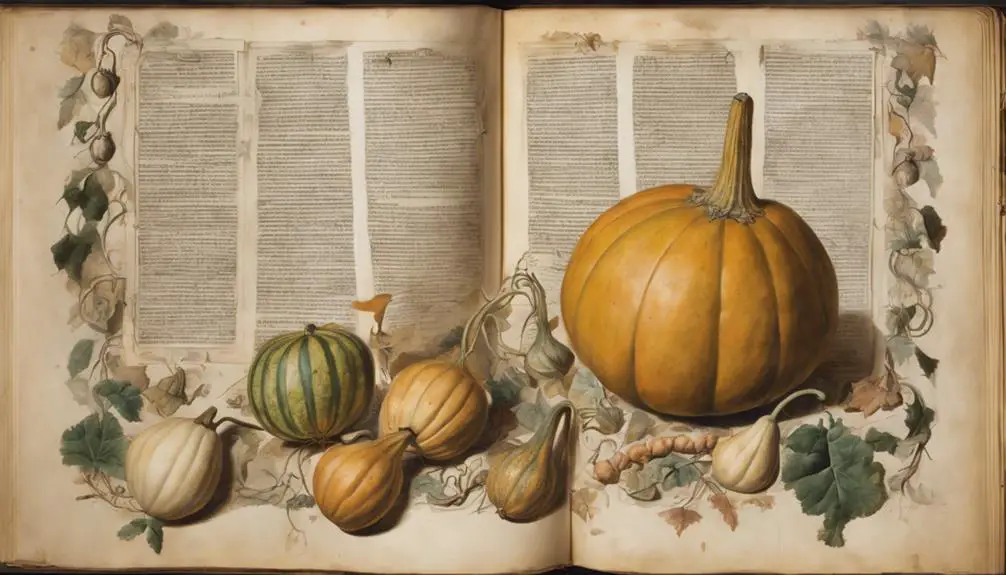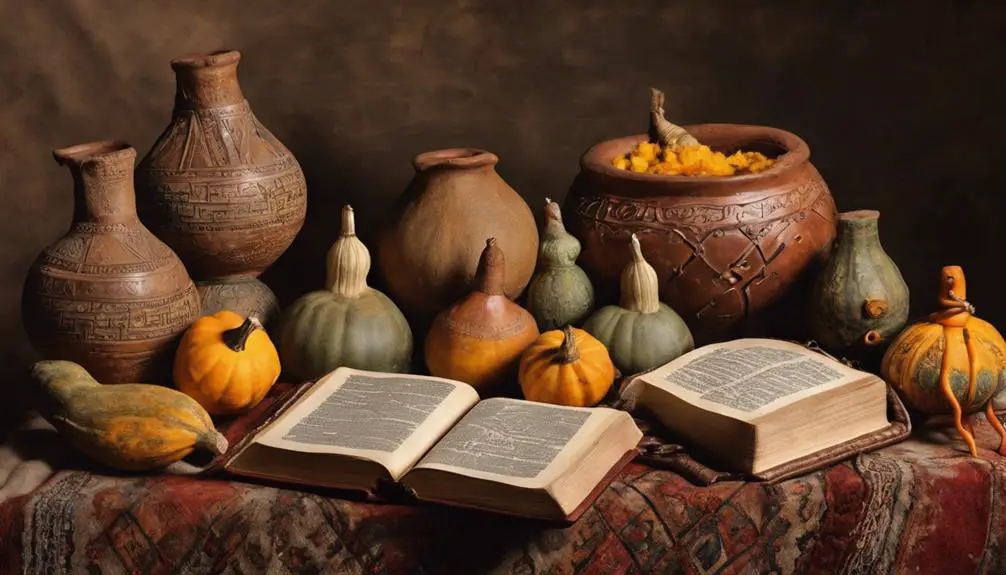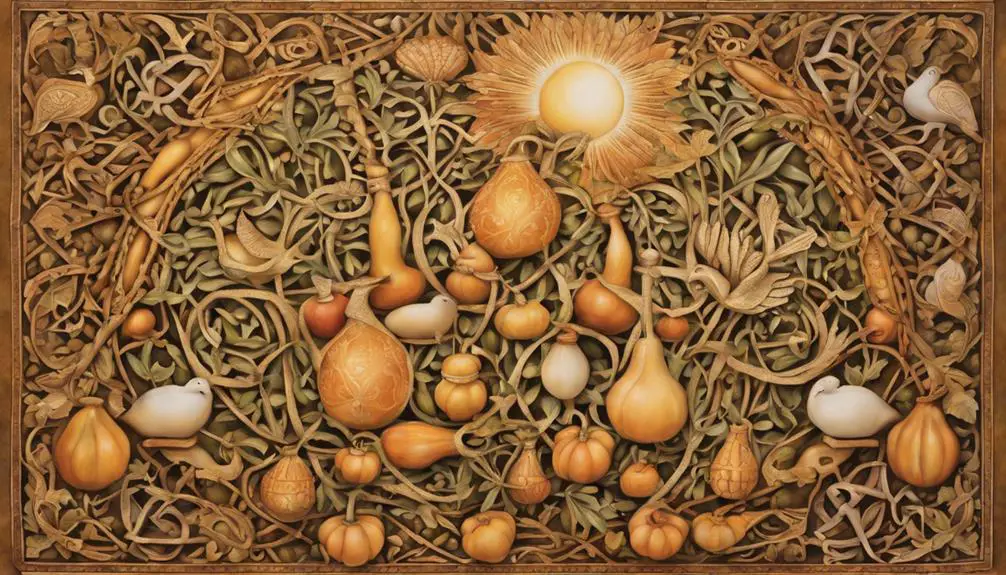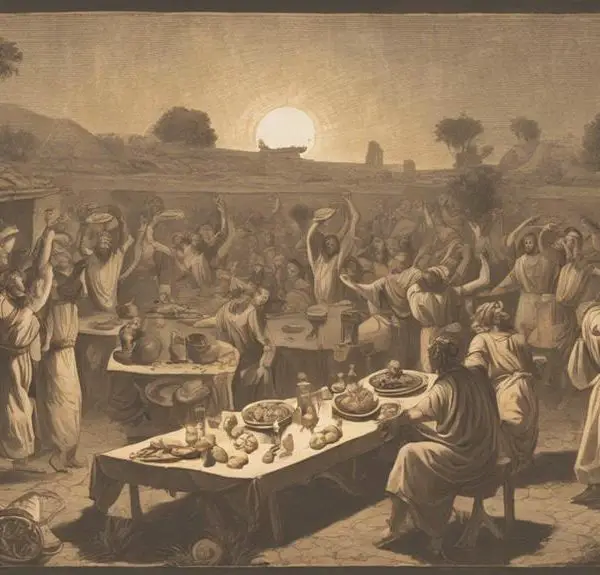Yearning to understand Biblical symbolism better? Explore the profound meaning of the humble gourd in the scriptures and unveil a deeper perspective.

Definition of Gourd in the Bible
Have you ever considered the significance of the gourd in the Bible?
It's mentioned in the Book of Jonah as a plant that God caused to grow to provide Jonah with shade.
However, deeper meanings and symbolism are often associated with this humble plant, offering a fresh perspective on ancient texts.
What if the gourd isn't just an element of Jonah's physical comfort, but a profound metaphor for God's mercy and grace?
Stay with us as we peel back the layers of Biblical symbolism to truly appreciate the depth of these narratives.
Key Takeaways
- Gourds in the Bible symbolize abundance, transitory life, divine provision, and emptiness.
- Culturally, gourds represented fertility, practicality, and were widely used in ancient Middle Eastern societies.
- In biblical narratives, gourds carry profound metaphorical meanings related to life, spirituality, and human conditions.
- Modern interpretations of biblical gourd symbolism underline spiritual nourishment, divine providence, and gourds as vessels for wisdom.
Understanding Biblical Symbolism

To fully grasp the significance of the gourd in the Bible, you need to understand the broader context of biblical symbolism, a critical aspect of biblical interpretation that provides depth and nuanced meanings to the holy text. In this realm of Symbolic Language Exploration, everyday objects, plants, animals, or even numbers aren't merely what they appear to be on the surface, but often carry a metaphorical or allegorical significance.
Delving into Biblical Metaphor Analysis, you'll find that symbolism is a linguistic tool used to convey complex religious truths in an understandable manner. This method of interpretation promotes a richer comprehension of the teachings and doctrines embedded within the scriptures. It's a process that requires intellectual engagement and a willingness to dig deeper than the literal words on the page.
Gourd References in the Bible

Now, as you broaden your understanding of biblical symbolism, let's explore the specific references and symbolic meanings of gourds in the Bible. The Bible uses gourds in a variety of contexts, and these can be divided into two primary categories: Gourd Metaphors and Gourd Parables.
Firstly, Gourd Metaphors are used to convey deeper truths. The book of Jonah, for instance, refers to a gourd plant that God causes to grow over Jonah's head, providing him with shade. This metaphorically speaks of God's protection and provision.
Secondly, Gourd Parables are used for instructive purposes. In 2 Kings, we find a parable about a pot of stew being poisoned by wild gourds. This serves as a warning against the dangers of unwise choices.
Consider the table below, which provides a concise summary of these references:
Gourd Metaphors |
Gourd Parables |
|
|---|---|---|
1. |
Jonah's gourd |
Poisonous stew |
2. |
Divine protection |
Unwise choices |
3. |
God's provision |
Spiritual danger |
Cultural Context of Gourds

Delving deeper into the cultural context, you'll find that gourds held significant roles in ancient societies, particularly in the Middle East where biblical events predominantly occurred. Gourd cultivation was widespread due to its versatility, not only as a food source but also for utilitarian purposes. Various gourd varieties, with their unique shapes and sizes, offered an array of functions, from containers for storage to musical instruments and even vessels for flotation.
The importance of gourds is reflected in their inclusion in ancient religious texts, such as the Bible. They were grown in gardens and fields, signifying their commonality and accessibility to people of all social classes. Your understanding of the Bible, particularly the references to gourds, is enhanced by this cultural backdrop.
Further, gourds were integral to the agricultural economy, acting as a staple crop that supported sustenance and trade. They were valued not only for their practical uses but also for their symbolic representation of fertility and abundance. This cultural context provides a richer understanding of the significance of gourds in biblical times, shedding light on their mention in various biblical narratives.
Deep Symbolism of the Gourd

Often overlooked, the deep symbolism of the gourd in biblical texts reveals layers of meaning that extend beyond its practical uses. As you delve further, you'll find that gourd metaphors are intricately woven into the fabric of these ancient narratives, shedding light on the divine significance of this seemingly ordinary plant.
The gourd, often symbolizing abundance and prosperity, carries a divine significance. In other instances, it serves as a metaphor for transitory life due to its short growth cycle. The gourd's hard exterior and hollow interior can also symbolize the need for spiritual fulfillment, highlighting the emptiness of the materialistic pursuits.
The table below provides a clear understanding of these metaphorical representations:
Gourd Metaphor |
Divine Significance |
|---|---|
Symbol of Abundance |
Blessings and Prosperity |
Symbol of Transitory Life |
Mortality and Human Frailty |
Symbol of Emptiness |
Spiritual Fulfillment |
Through this analysis, you can see that the gourd's symbolism in the Bible is rich and multi-faceted, pointing towards a deeper understanding of the divine and human conditions. It's not just a plant, but a vehicle to convey profound spiritual concepts.
The Gourd in Modern Interpretations

In contemporary interpretations, you'll find that the biblical symbolism of the gourd continues to resonate, offering nuanced insights into spirituality and the human condition. Modern Gourd Usage often employs these symbols in literature, art, and even in colloquial language, reflecting a deep-seated cultural memory of the gourd's biblical significance.
Gourd Metaphors are particularly poignant in this context. As a symbol of spiritual nourishment, the gourd is often used in modern interpretations to represent the sustenance provided by faith. Just as a gourd vine provides shelter and sustenance, so too does faith provide a source of comfort and guidance in the trials of life. This interpretation underscores the enduring relevance of the gourd as a symbol of divine providence and protection.
Moreover, the gourd's metaphorical use as a vessel for knowledge and wisdom is also evident in modern interpretations. In this vein, the gourd serves as a reminder of the transformative power of divine wisdom, underscoring the potential of faith to catalyze personal growth and enlightenment.
Thus, the gourd's biblical symbolism continues to resonate in modern interpretations, shaping our understanding of spiritual concepts and the human condition.
Frequently Asked Questions
What Are the Different Types of Gourds Mentioned in the Bible?
You're asking about the different types of gourds mentioned in the Bible. Interestingly, there's only one specific mention of a gourd, in the book of Jonah.
This 'gourd' is often thought to be a castor oil plant. Gourd symbolism in biblical vegetation is associated with protection and provision.
However, it's important to note that interpretations may vary due to translation differences.
How Are Gourds Used in Other Religious Texts Outside of the Bible?
You'll find that gourds hold unique significance in various religions.
In Islam, gourd symbolism isn't as prevalent, but they're occasionally mentioned in Hadiths, serving as containers.
In Hinduism, gourds are depicted in various narratives, often symbolizing fertility and prosperity.
It's fascinating to see how these ordinary plants have such profound meanings in different religious texts.
Are There Any Specific Biblical Characters Associated With Gourds?
In the Bible, gourd symbolism is tied to the prophet Jonah. God provided Jonah with a gourd vine, which grew rapidly to offer him shelter. This gourd, however, wilted just as quickly, teaching Jonah a lesson about God's compassion and judgment.
How Are Gourds Used in Traditional Biblical Ceremonies or Rituals?
In traditional biblical ceremonies or rituals, gourds aren't directly mentioned. You won't find them playing a specific role. However, the symbolism of gourds, often representing abundance or plenty, might've been understood.
It's important to note, there's no explicit ceremonial significance of gourds in the Bible. Remember, biblical interpretation varies greatly, so others might hold different views.
Can the Use of Gourds in the Bible Be Linked to Any Specific Biblical Events or Miracles?
Yes, you can link gourd use in the Bible to specific events. Gourd symbolism often represents temporary comfort. For instance, Jonah's story features a gourd that provides short-lived shelter.
It's not tied to miracles, though. Gourd metaphors are used to reflect life's transient nature in Biblical texts. So, while it's an intriguing aspect, don't expect to find gourds at the center of miraculous happenings.
Conclusion
So, as you delve deeper into biblical texts, you'll uncover the gourd's profound symbolism. It's not just an ordinary fruit but a complex symbol reflecting life's impermanence and our human frailty.
From its cultural context to its modern interpretations, the gourd holds a unique place in biblical literature.
Always remember, the richness of these texts lies in their layers of meaning – just like the gourd, they offer more than what meets the eye.



Sign up